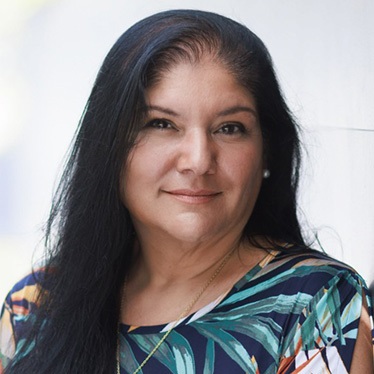The Dynamic Sustainability Lab: Creating a Sustainable Future
April 17, 2024
An inside look at the lab pioneering solutions for a net-zero carbon economy.
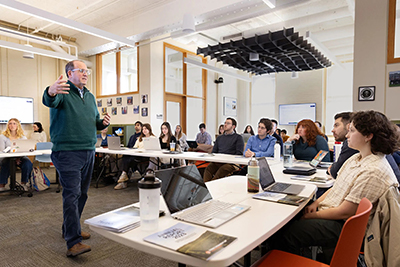
As governments and businesses around the globe grapple with reducing greenhouse gas emissions and achieving sustainability, students in the Dynamic Sustainability Lab (DSL) at Syracuse University are building a knowledge base that examines the benefits and consequences of transitioning to a net-zero carbon economy. Whether the issue is electric vehicles (EVs), sustainable supply chains or myriad topics that encompass finance, insurance, land use and new technologies, the lab’s students perform in-depth research and share their findings in technical bulletins, presentations and other communications.
“We try to explain the environmental, economic and social benefits as well as possible unintended consequences and risks of the net-zero transition to decision makers,” says Jay Golden, founder and director of the lab and the Pontarelli Professor of Environmental Sustainability and Finance in the Maxwell School of Citizenship and Public Affairs. “We provide solutions in the sense of pointing out the different scenarios and the issues to be aware of regarding these transitions.”
Building a Global Network of Partnerships
Golden, author of “Dynamic Sustainability: Implications for Policy, Markets and National Security” (Cambridge University Press, 2023), established the DSL in 2021 when he joined the Syracuse faculty. An internationally renowned expert in this wide-ranging interdisciplinary field, he draws on decades of academic and industry experience and a worldwide list of contacts who inform the lab’s initiatives and help guide the students.
The lab features faculty partners from across the University, SUNY College of Environmental Science and Forestry and other domestic and global partners who collaborate with the students, and its advisory council includes representatives from such companies as Amazon and Walmart. Golden cites Ken Pontarelli ’92 and his wife, Tracey, for their support of his professorship and the lab’s creation. “The Pontarellis have made this all possible,” he says.
The students—who are paid as research fellows—work in teams, mentor one another, regularly collaborate with multinational companies and governments, have access to proprietary databases to inform their research and give presentations to stakeholders. In addition to the various research areas, there are teams that work on communications as well as community outreach.
Here is a look at several initiatives underway at the lab.
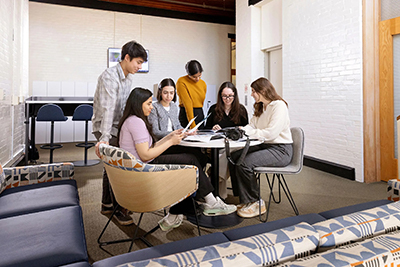
Empowering Climate-Smart Initiatives
A major initiative of the lab is the climate-smart commodities project, which is focused on developing the systems and policies to bring these low-carbon agriculture feedstocks and products to the marketplace across the country. This includes strategies and technologies to improve and better track greenhouse gas mitigation and carbon sequestration while also creating and expanding markets. The undertaking—part of a $60 million multi-institutional grant from the U.S. Department of Agriculture—involves several DSL teams.
- Bioplastics: Jacob Snelling ’24, a biology and environment, sustainability and policy (ESP) major, is researching the emerging bioplastics industry, which uses biological materials, such as wood chips, to create sustainable polymers for use in construction, consumer goods and other products. “There are definitely some substantial obstacles,” he says. “But there’s plenty of room for innovation with a lot of the different sustainable industries.”
- Data Needs: Sophie Creager-Roberts ’24, a history and ESP major, and Framke Vitale ’24, a marketing management major, are investigating the data and technology needs for producers and other value chain members. The idea is to track the value chain or lifecycle of a product, from inception to disposal. This includes measuring, monitoring, reporting and verifying data to create trust in the marketplace. Through their work, they’ve published a technical bulletin that describes the drivers for climate-smart commodities and challenges for producers.
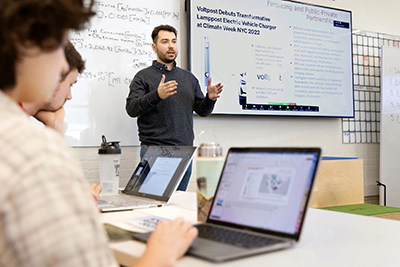
Michael Garzone-White G’24 gives a presentation in the lab about issues related to the transition to electric vehicles.
- Blockchain Technology: One way to monitor products is through blockchain technology, which documents and tracks transactions. Lahari Chowtoori G’24, an applied data science graduate student, Vrushali Lad G’25, an information systems graduate student, and Jonah Komosinski ’25, a business analytics and information management and technology major, are part of a team looking to introduce the technology. Blockchain, for instance, can be used to monitor, report and verify carbon emissions throughout the timber supply chain. “By using blockchain labels, we can track the origins of all products, trace their journey through processing and use in manufacturing, and quantify the carbon emissions incurred throughout the process,” Chowtoori says.
- Community Connections: As part of the underserved communities team, master of public administration (M.P.A.) students Calista Albring ’23, G’24 and Sydney King G’24, who’s also pursuing a master’s in international relations, are creating two-page information sheets (in English and Spanish) on forestry, agriculture, and brand and manufacturing. They are learning about the challenges underserved foresters face and identifying businesses to connect them with. They also want to ensure foresters are educated about sustainable practices and have access to blockchain and other emerging technologies. “It’s important for foresters to have the resources they need and know who they can reach out to,” King says.
- Policy Incentives: M.P.A. student Omer Keles G’24 is part of a public policies team examining which policies and programs would best incentivize farmers, producers and processors to adopt climate-smart practices. They’re developing a one-stop-shop database for stakeholders that would feature information on different programs, including technical assistance and incentives, and are also exploring ways to coordinate outreach.
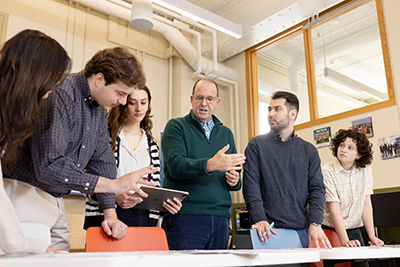
Helping Local Communities Move Forward
The lab established the Syracuse University Climate Corps team as a way for students from across the University to help local communities address pressing climate, energy and sustainability issues. Last November, for example, the team hosted a workshop for local municipal leaders to learn about issues that impede their progress toward sustainability. Team member Kaai I ’24, an international relations and policy studies major, has initiated a collaboration with the Village of Pulaski, N.Y., to assess the environmental impact and risks of its housing stock. As he points out, many local governments are understaffed and don’t have the resources to properly address costly environmental issues. “Sustainability is emphasizing sustainable actions beyond our environment,” he says. “We need to be sustainable in the way we employ and treat people in the workforce, and in the way we help municipal governments and ensure they have the resources and manpower they need."
Navigating the Electric Vehicle Transition
The EV transition team is producing a guidebook designed to help local and state government officials and industry leaders across the country understand the different implications involved in the transition, including fuel tax and lottery revenues, road and vehicle maintenance and the importance of public-private partnerships that embrace innovative technologies. “One of the most integral parts of the EV transition is local governments can’t take on the construction of thousands of EV charging stations by themselves,” says M.P.A. student Michael Garzone-White G’24.
Communicating the Messages
The DSL communicates its findings through a variety of media. Kristin Hauptman ’23, G’24, a multimedia photography and design graduate student, leads the graphics team and directs the lab’s annual report, and Quinn Pierson ’24, a religion and geography major, guides the social media and web efforts. They collaborate with student researchers on numerous projects. “Our technical bulletins are easier for people to understand when we add appealing visualizations of data,” Hauptman says. “We want to make the research accessible to a larger community.”
By Jay Cox
Related News
School News

Dec 19, 2024
School News

Dec 11, 2024
School News

Dec 10, 2024
